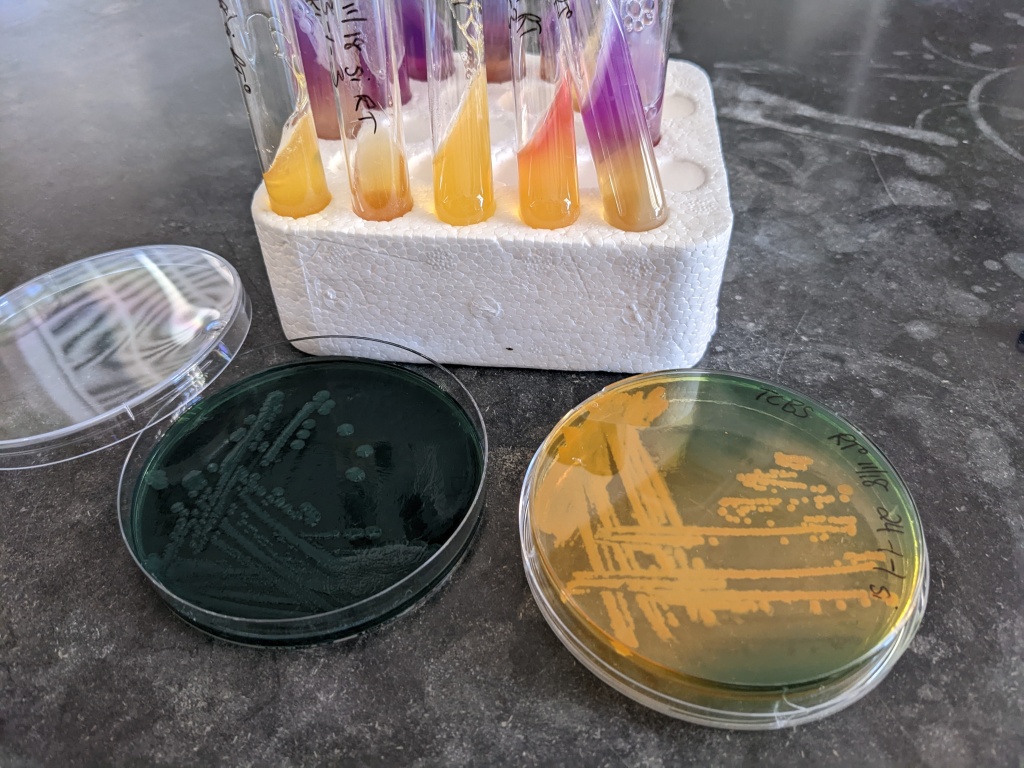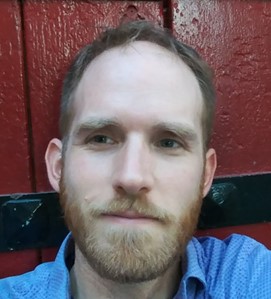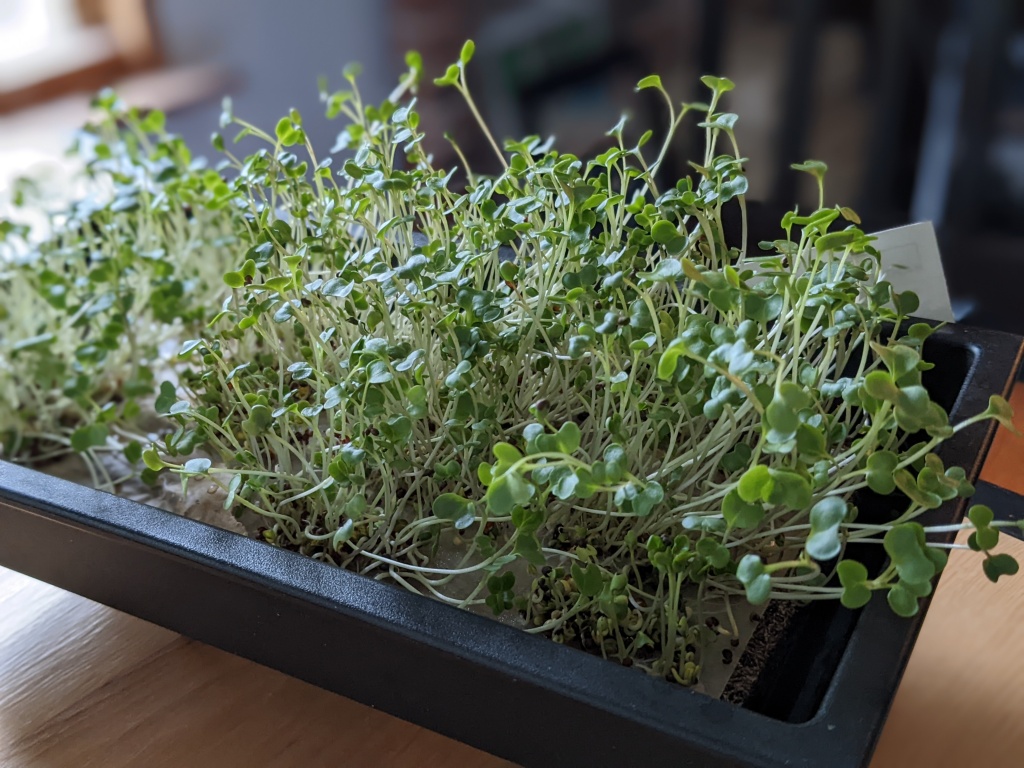The Ishaq Lab will be presenting at a few research conferences this summer, with a few more in the works for the fall.
Steamed broccoli sprouts alleviate gut inflammation and retain gut microbiota against DSS-induced dysbiosis.
Poster, abstract P20-022-23, July 23
Authors: Johanna M. Holman*1, Lola Holcomb2, Louisa Colucci3, Dorien Baudewyns4, Joe Balkan5, Grace Chen6, Peter L. Moses7,8, Gary M. Mawe7, Tao Zhang9, Yanyan Li1, Suzanne L. Ishaq1
Affiliations: 1 School of Food and Agriculture, University of Maine, 2 Graduate School of Biomedical Sciences and Engineering, University of Maine, 3 Department of Biology, Husson University, 5 Department of Chemical and Biological Engineering, Tufts University, 6 Department of Internal Medicine, University of Michigan Medical School, 7 Departments of Neurological Sciences and of Medicine, Larner College of Medicine, University of Vermont, 8 Finch Therapeutics, 9 School of Pharmacy and Pharmaceutical Sciences, SUNY Binghamton University.
Objectives: Inflammatory Bowel Diseases (IBD) are devastating conditions of the gastrointestinal tract with limited treatments, and dietary intervention may be effective, affordable, and safe for managing symptoms. Ongoing research has identified inactive compounds in broccoli sprouts, like glucoraphanin, and that mammalian gut microbiota play a role in metabolizing it to the anti-inflammatory sulforaphane. The objectives were to identify biogeographic location of participating microbiota and correlate that to health outcomes.
Methods: We fed specific pathogen free C57BL/6 mice either a control diet or a 10% steamed broccoli sprout diet, and gave a three-cycle regimen of 2.5% dextran sodium sulfate (DSS) in drinking water over a 40-day experiment to simulate chronic, relapsing ulcerative colitis. We monitored body weight, fecal characteristics, fecal lipocalin, and sequenced bacterial communities from the contents and mucosa in the jejunum, cecum, and colon.
Results: Mice fed the broccoli sprout diet while receiving DSS performed better than mice fed the control diet while receiving DSS for all disease parameters, including significantly more weight gain (2-way ANOVA, p < 0.05), lower Disease Activity Index scores (2-way ANOVA, p < 0.001), and higher bacterial richness in all gut locations (linear regression model, p < 0.01 for all locations measured). Bacterial communities were assorted by gut location except in the mice receiving the control diet and DSS treatment (Beta-diversity, ANOVA, p < 0.05 for each). Importantly, our results suggested that broccoli sprout feeding completely abrogated the effects of DSS on gut microbiota, as bacterial communities were similar between mice receiving broccoli sprouts with and without DSS.
Conclusions: Spatially resolved microbial communities provide greater insight when investigating host-microbe interactions. Here, we show that a 10% broccoli sprout diet protects mice from the negative effects of dextran sodium sulfate induced colitis, that colitis erases biogeographical patterns of bacterial communities in the gut, and that the cecum is not likely to be a significant contributor to colonic bacteria of interest in the DSS mouse model of ulcerative colitis.
Funding Sources: This work was funded by the NIH, USDA, NSF NRT, and UMaine GSBSE.
Early life exposure to broccoli sprouts confers stronger protection against enterocolitis development in an immunological mouse model of inflammatory bowel disease.
Poster, abstract P20-021-23, July 23
Authors: Lola Holcomb*1, Johanna Holman2, Molly Hurd3, Brigitte Lavoie3, Louisa Colucci4, Gary M. Mawe3, Peter L. Moses3,5, Emma Perry6, Allesandra Stratigakis7, Tao Zhang7, Grace Chen8, Suzanne L. Ishaq1, Yanyan Li1
1 Graduate School of Biomedical Sciences and Engineering, University of Maine, 2 School of Food and Agriculture, University of Maine, 3 Larner College of Medicine, University of Vermont, 4 Department of Biology, Husson University, 5 Finch Therapeutics, 6 Electron Microscopy Laboratory, University of Maine, 7 School of Pharmacy and Pharmaceutical Sciences, SUNY Binghamton University, 8 Department of Internal Medicine, University of Michigan Medical School.
Objectives: Inflammatory Bowel Diseases (IBD) are chronic conditions characterized by inflammation of the gastrointestinal (GI) tract that burden daily life, result in complications, and disrupt the gut microbiome. Many studies on diet and IBD in mice use an ulcerative colitis model, despite the availability of an immune-modulated Crohn’s Disease model. The objective of this study was to establish IL-10 deficient mice as a model for studying the role of dietary broccoli and broccoli bioactives in reducing inflammation, modifying the immune response, and supporting GI tract microbial systems.
Methods: Interleukin-10-knockout (IL-10-ko) mice on a C57BL/6 background, beginning at age 4 or 7 weeks, were fed either a control diet or one containing 10% raw broccoli sprouts. Diets began 7 days prior to inoculation with Helicobacter hepaticus, which triggers Crohn’s-like symptoms in these immune-impaired mice, and ran for 2 additional weeks.
Results: Broccoli sprouts decreased (p < 0.05), fecal lipocalin (LCN2), a biomarker for intestinal inflammation, and fecal blood, diarrhea, and overall Disease Activity Index. Sprouts increased gut microbiota richness, especially in younger mice (p < 0.004), and recruited different communities in the gut (B-diversity, ANOVA, p < 0.001), especially in the colon (B-diversity, ANOVA, p = 0.03). The control group had greater prevalence and abundance of otherwise commensal bacteria which trigger inflammation in the IL-10-ko mice. Helicobacter was within the top-5 most prevalent core genera for the control group, but was not within the top-5 for the broccoli group. Disease parameters and microbiota changes were more significant in younger mice receiving broccoli.
Conclusions : A diet containing 10% raw broccoli sprouts may be protective against negative disease characteristics of Helicobacter-induced enterocolitis in IL-10-ko mice, and younger age is the most significant factor (relative to diet and anatomical location) in driving gut bacterial community richness and similarity. The broccoli diet contributes to prevalence and abundance of bacterial genera that potentially metabolize dietary compounds to anti-inflammatory metabolites in the gut, are bacteriostatic against pathogens, and may ease disease severity.
Funding Sources: This work was funded by the NIH, USDA, NSF NRT, and UMaine GSBSE.
Establishing Growth Curve Assays for Bacterial Glucosinolate Metabolism: A Study Protocol
Poster, abstract P22-030-23, July 23
Marissa Kinney*1, Ryan Wijayanayake1, Johanna Holman1, Timothy Hunt2, Benjamin Hunt 2, Tao Zhang3, Grace Chen4, Yanyan Li1 , Suzanne L. Ishaq1
1School of Food and Agriculture, University of Maine, Orono, Maine, USA 04469; 2 School of Biology and Ecology, University of Maine, Orono, Maine, USA 04469; 3 School of Pharmacy and Pharmaceutical Sciences, SUNY Binghamton University, Johnson City, New York, USA 13790; 4 Department of Internal Medicine, University of Michigan Medical School, Ann Arbor, Michigan, USA 48109
Objective: Inflammatory bowel diseases (IBD) cause dysfunction of the gastrointestinal (GI) tract and can result in hospitalization, suffering and disruption to overall health. Recent work has demonstrated the anti-inflammatory capacity of a broccoli sprout-diet in artificially-induced GI inflammation in pathogen free C57BL/6 mice. Microbiota samples obtained from the GI tract of these mice will be used to study the presence and activity of broccoli glucosinolate hydrolysis to create microbial-sourced bioactives, to further understand the relationship between broccoli-diets and inflammation reduction. It is imperative to validate or replicate qPCR protocols which have been established for glucosinolate metabolism in Bacteroides thetaiotaomicron (B. theta), in other bacterial species. Additionally, this project will focus on developing new growth curve assays for glucosinolate metabolism, as these methods are lacking in published literature.
Methods: Pathogen free C57BL/6 mice were given dextran sodium sulfate (DSS) into their drinking water to create a disease profile similar in development and morphology to human ulcerative colitis (UC), a type of IBD. DSS and a steamed broccoli sprout diet were administered. Samples were taken from the digesta, jejunum, cecum, and colon of mice fed broccoli diets. About 806 bacterial isolates will be grown up/cultured anaerobically on minimal/selective media containing glucosinolate-related compounds (glucoraphanin, sinigrin) to determine hydrolysis activity via spectroscopy to measure optical density of growth in competent isolates. Successful isolates will be further analyzed with LC/MS to confirm production of bioactive products, and with qPCR using the B. theta positive control genome to help identify gene targets (α-1,6-mannanase, glycosyl hydrolase, nicotinamide-dependent oxidoreductase, and transcriptional regulator protein) for glucosinolate conversion in isolates.
Results N/A
Conclusions: In the initial study from which these samples are sourced, mice fed a broccoli diet had less inflammation than those fed a control diet and DSS, and had higher bacterial diversity in their gut. We expect that bacteria isolated from the GI of broccoli-fed mice will contain more glucosinolate-metabolizing genes.
Funding: NIH (Li and Ishaq) and USDA (Li).
Broadening Perspectives by Situating Nutrition Education in Broader Social Contexts: A Study Protocol
Poster, abstract number 1490287, July 23
Authors: Ashley Toney*1, Patricia Wolf*2, Sue Ishaq*3
Affiliations: 1Dept. of Cardiovascular and Metabolic Sciences, Cleveland Clinic Lerner Research Institute, 2 Department of Nutrition Science, Purdue University, 3 School of Food and Agriculture, University of Maine
Objectives: The Microbes and Social Equity (MSE) Working Group connects microbiology with social equity research, education, policy, and practice to understand the interplay of microorganisms, individuals, societies, and ecosystems. Given the complexity and nuance of evidence-based nutrition delivery, MSE sought to provide a conceptual structure. The goals are 1) convene diverse researchers, educators, learners, and practitioners, 2) publish and present evidence-based information within socio-cultural contexts, and 3) teach audiences to define ways for integrating equity into their work.
Methods: MSE hosted a 14-week speaker series in 2021, 2022, and 2023, with researchers from various disciplines (e.g., nutrition, gut microbes, food security). The series lead into a 5-day symposium of speakers and guided discussions to generate co-written documents identifying research needs and resources. We use targeted and non-targeted event promotion to attract audiences, and reach/impact is evaluated through registration, attendance, social media views, or attendee feedback. The series provides learning sessions that build concepts over time, guiding attendees past the conceptual roadblock of being new to interdisciplinary research and grappling with grand challenges. This extended period to learn stimulates participation in activity-based collaboration during symposia, even from new members or students. 2023 symposium attendees will be surveyed on their impressions on the event, how it impacted their perspective on experimental design, whether attendees started with the series and followed up with the symposium, and whether having the preface of the series aided in being able to create actionable outputs in a guided co-working session.
Results: n/a
Conclusions: Benefits include nuanced knowledge/perspective sharing, establishing and nurturing interdisciplinary collaboration, and sparking conversations on critical topics in policy, sustainability, host and microbial metabolism, etc. In the last 3 years, MSE published 4 papers together, with ~ 50 independent papers from members. Event recordings are used as curriculum in nutrition, microbiology, and pre-med biology.
Funding Sources: NIH/NIDDK, Allen Foundation (Ishaq); National Dairy Council (Toney)



















































